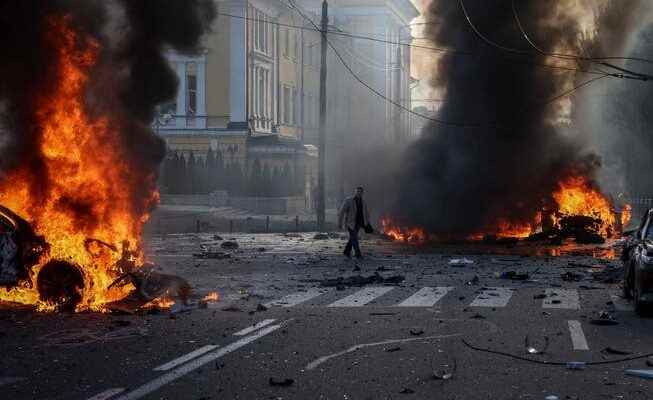Two days after the explosion on the Crimean bridge, the Russian army attacked civilian infrastructure in dozens of Ukrainian cities. Kyiv suspects that a new wave of refugees is to be triggered.
Burning cars in central Kiev after a Russian attack.
Air raid sirens wailed almost non-stop across Ukraine on Monday. The Russian army fired more than 80 rockets at around a dozen larger cities, including the capital Kyiv, which had not been shelled since June.
The western Ukrainian oblast capitals of Lviv and Ternopil were also targets of Russian attacks, some of which were carried out with drones in densely populated areas. The main damage was the energy infrastructure. By Monday evening, the Ukrainian authorities had reported 11 dead and 60 injured across the country.
A rocket attack on the central Kiev residential area around the main station is said to have killed eight people alone. The visa office of the German embassy was also hit by rocket attacks. A spokesman for the Foreign Office in Berlin confirmed damage to the high-rise building, which has not been in service for months.
In many cities, the power went out at times. A missile attack on the port city of Odessa apparently violated Moldovan airspace after cruise missiles were fired from a warship in the Black Sea. The Russian ambassador in Chisinau was summoned to the Foreign Ministry.
According to the Ukrainian General Staff, it managed to intercept just over half of the missiles. The Russian army is said to have also used Iranian Shahed-136 drones in the attacks, which were launched in Belarus and on the annexed peninsula of Crimea, an army spokesman said in Kyiv.
Russia calls Kyiv “a threat”
The Russian Defense Ministry was satisfied with the operation on Monday afternoon. “The aim of the strike was achieved, all selected targets were hit,” said Defense Ministry spokesman Igor Konashenkov.
The Kremlin did everything it could on Monday to give the impression that the widespread attacks were a hastily planned retaliation for Saturday’s Crimean Bridge explosion. At the weekend, Russian President Vladimir Putin blamed the Ukrainian secret service SBU for the attack. Ukraine has not acknowledged this.
If the Ukrainian “terrorist attacks” continue, Russia will respond even more harshly, Putin threatened on Monday on the sidelines of a meeting of the National Security Council in St. Petersburg. In the run-up to the meeting, there had been speculation that the Security Council could give the green light for strikes with tactical nuclear weapons.
On Monday night, the Deputy Head of the Russian Security Council, former President Dmitry Medvedev, also had Ukraine retribution threatened. The Ukrainian state in its current form is a constant threat to Russia, so the political leadership of the neighboring country must be eliminated, Medvedev wrote.
According to the Ukrainian military intelligence service, the massive attacks on the energy infrastructure in a densely populated area were decided at the beginning of October, i.e. before the explosions on the Crimean bridge. According to this interpretation, the destruction should trigger a new movement of refugees towards the EU. Since the summer, more Ukrainians have returned home than went in the opposite direction to Hungary, Slovakia or Poland.
Strengthening of Ukrainian anti-aircraft defenses
During a phone conversation with his Ukrainian counterpart Zelensky, President Emmanuel Macron stressed the urgency of strengthening Ukraine’s air defenses. France has also promised Ukraine more help with military equipment, according to the Presidential Palace in Kiev.
The EU responded to the Russian bombing by extending the protection status of war refugees from Ukraine by another year. The corresponding regulation will be extended at least until March 2024, announced EU Interior Commissioner Ylva Johansson. The recent attacks on Ukrainian cities show how important solidarity with the country is.
In Belarus, Alexander Lukashenko’s attempt not to let his country be drawn directly into Russian offensive operations continued on Monday. The autocrat announced that Minsk and Moscow are about to set up a joint military task force. However, he gave neither numbers of troops nor the possible location of such a new formation. Lukashenko also announced that thousands of Russian soldiers would be stationed in his country.
Russia had already used Belarusian territory as a deployment area for the attack against Ukraine in February. Kyiv fears that the Belarusian army could invade Ukraine from the north. On Monday, however, the Ukrainian general staff once again gave the all-clear: no invasion was imminent.
